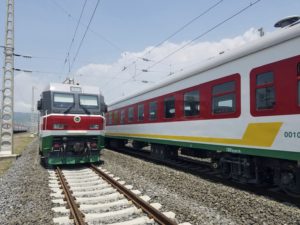- Stay Connected
Djibouti-Ethiopia railway carries hope for pan-African trade

The Djibouti-Ethiopia rail line promises to boost the economies of both nations © AFP
The sleek passenger train waiting for its inaugural journey at Djibouti’s barely finished Nagad station almost stretched out of sight down the platform. Three tracks behind it was an even longer goods train of dark green wagons that were so new they had yet to be stained by the dust that is ubiquitous in this corner of the Horn of Africa.
Some 2,000 people had gathered on Tuesday to celebrate the completion of Africa’s first standard-gauge, international railway, between Djibouti and the Ethiopian capital Addis Ababa. Politicians hope it will not only boost the two countries’ economies but start to unlock the continent’s untapped commercial potential. “It’s an historic moment,” Hailemariam Desalegn, the Ethiopian prime minister, said in his speech at the ceremony. “It will significantly expand development and enhance our competitiveness in international markets.” When commercial services begin on the line in a few months, the time to transport a container from Addis Ababa to Djibouti should fall from three days to 10 hours and the cost is expected to be slashed by a third. Officials say each freight train could transport the same cargo as 200 trucks. The ports in Djibouti — which has an authoritarian government and is home to US, French and Japanese military bases — are used by landlocked Ethiopia for the vast majority of its imports and exports. The latter are mostly coffee and other agricultural products, including flowers and leather goods. It is building industrial parks in an effort to establish itself as a manufacturing hub. But Mr Hailemariam and his Djiboutian counterpart, President Ismail Omar Guelleh, have much grander ambitions than merely transforming their own nations.
“I hope it will not be too long before we are able to travel by rail from Djibouti to Dakar and other west African cities,” Mr Hailemariam said, referring to the Senegalese capital 8,400km away. For this is what politicians and businesspeople are hoping; that, despite myriad obstacles such as civil wars and impoverished governments, the $4.2bn, 752km line will be the start of a pan-African network that will act as a catalyst to boosting the relatively anaemic level of intra-African trade. The African Export-Import Bank estimates that intra-African trade was only 19 per cent of the continent’s $930bn total trade last year, compared with more than 60 per cent for the EU. “It’s a must that we build it,” said Aboubaker Omar Hadi, the chairman of the Djibouti Ports and Free Zones Authority. “We have 15 landlocked countries in the continent. Ten of them are in our region. Over 400m people are landlocked. So we need to build more ports and land bridges to connect those people to the rest of the world.” Other African nations are also spending billions of dollars to replace slow, narrow-gauge lines such as the one that linked Addis Ababa to Djibouti with new standard-gauge railways. Many are more than a century old. Nigeria has opened a 190km line from Abuja to Kaduna, the first stretch of a project aiming to go 830km from Lagos to Kano. Kenya is set to open this year a 485km-line from the port of Mombasa to the capital Nairobi and is already planning to extend it towards Uganda. And talks to revitalise the century-old Tanzania Zambia Railway Authority are well under way. Related article Crackdown on protests threatens Ethiopia’s boom Companies halt expansion amid fears state is not addressing protesters’ grievances But connecting any of these will be a mammoth task, let alone building a line between west and east Africa. That is likely to remain a pipe dream for years, not least because it will have to go through war-ravaged South Sudan, which is also almost bankrupt, and the Central African Republic. Ethiopia’s stability is also under scrutiny after 11 months of anti-government protests led to a state of emergency being imposed last October. Some foreign investors’ facilities were attacked last September and diplomats have said the railway could become a target. China’s role is another crucial factor in Africa’s railway renaissance. Beijing is financing and building most of the standard-gauge lines across the continent and officials say it is hard for anyone else to compete. “The Chinese have put it all into a single solution,” said Jean-Pierre Loubinoux, general director of the International Union of Railways, an industry body. “They bring the money, the technology, the workers and with the cheap cost and good organisation they can offer a great package.”
China is clearly keen to do more African railway projects. Wang Yi, China’s foreign minister, said on a visit to Zambia this month that Beijing intended to finance the modernisation of the line to Tanzania. And Yuan Li, the president of the China Civil Engineering Construction Corporation, which built the Djibouti-Ethiopia line, said at the inauguration ceremony: “We believe that in the near future this railway will be the lifeline of an important economic zone where marvellous wonders will come to life.” Copyright The Financial Times Limited 2017. All rights reserved. You may share using our article tools. Please don’t cut articles from FT.com and redistribute by email or post to the web.
source: https://www.ft.com/content/42d7af2e-d95a-11e6-944b-e7eb37a6aa8e
